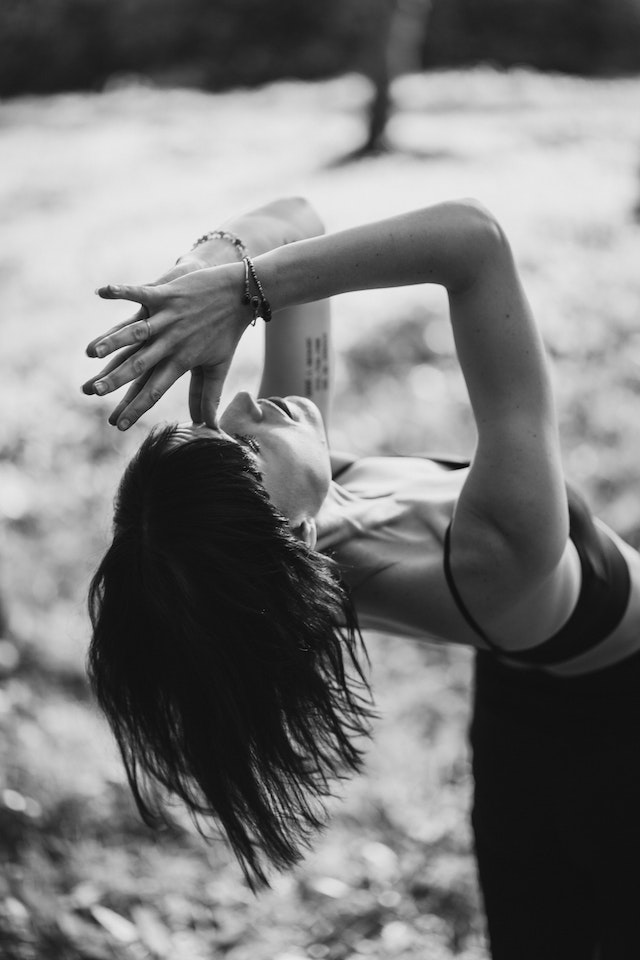
On the road again…
I recently worked in a local recovery center for drug and alcohol addiction.
I was stepping in for the resident yoga therapist for a couple of weeks. And after a morning session observing the therapy for residents, I felt confident about stepping in seamlessly with little disruption to the therapeutic recovery rhythm.
So, when I showed up at 6:15 a.m. the following Tuesday, I led the gentlemen through a morning practice followed by some fellowship and reflection on the niyama (personal duty) for the day: ahimsa, or non-harm.
After a brief break, the participants returned and one friendly resident asked me, as he made his way back to his mat, “So Pam, are you in recovery?”
I gave it a nano second to register—a quick flash of naked exposure heated my thoughts and skin. No, I had never been treated for drug or alcohol addiction. Would my truthful answer discredit me, make me a less credible yoga therapist for this group?
The familiar grip of imposter syndrome held me. I blinked.
And with a mere breath’s hesitation, I doffed off, “Aren’t we all in recovery for something?” Then I smiled, continuing with my preparation for the rest of the morning.
I immediately regretted the response. In my anxiousness to prove my competence, I not only dodged the question but denigrated the efforts of everyone in the room. By generalizing about the word “recovery,” didn’t I trivialize the weight of those earnest men struggling to fight addiction?
The scene plays out in my mind occasionally since that day months ago. I bite the corner of my lip and cringe involuntarily each time.
What I meant, I think, was that I have not experienced drug and alcohol addiction, but I have quieter addictions.
Confess your addictions and I’ll tell you who you are.
Decades ago, I accompanied my mother to a 12-step codependency meeting, feeling awkward and strange at the confessional nature of the meeting and the slipperiness of the codependency term. Is it being too nice, too helpful, or too controlling? I could not get a grasp on it, but I recognized that I shared many of the same stories as those testifying tearfully.
As a 20-something, I could appreciate there was an addiction called co-dependency but did not believe I had it. After all, I was already in college bettering myself to become a career woman, claiming my independence. I depended on no one—so I thought.
Decades later, I would not only realize I was in a codependent relationship but that I was a workaholic, like my father. He prided himself on his 72-hour work week in a factory to keep his family of seven fed in the suburbs. He detested his job, but he was nothing if not responsible.
My mother worked just as long and dedicated hours childrearing, housekeeping, and landscaping, among everything else she did during the long day.
But considering my long-ago, 14-hour days at the law office or seven-day work weeks at seven jobs I still maintain, I know that I am running from something. It’s a trauma response, I am often told.
And what about the CBD habit for nightly sleep since menopause years ago? Is that an addiction? I am afraid to skip a night for fear of losing sleep. And I haven’t even mentioned the lifelong, on-again off-again relationship with tobacco.
Do any of these habits rise to addiction? Am I in recovery? I am growing aware that my habits are slowly eroding my health and happiness, especially the workaholism. I am out of balance.
Can I say I am in recovery?
I need a definition.
In searching the internet, I came across numerous definitions for mental health and addiction recovery. The Substance Abuse and Mental Health Services Administration describes recovery as “a process of change through which individuals improve their health and wellness, live a self-directed life, and strive to reach their full potential.” The government website explains that change lies in managing symptoms, making healthier choices for physical and emotional well-being, living in stable and safe places, and enjoying meaningful activities in daily life and community relationships.
Imbalance is a symptom of addiction. It’s being off center, having no time, energy, or room for friends and family, too busy feeding an addiction—and isolation is the result. It may take a while for the loneliness to kick in, but at some point, we realize we are disconnected and alone.
Sometimes our world falls apart before we can reach for help. And then the yearning surfaces. Hope for a better life is the interior motivator; help from peers, friends, family, and professionals is the exterior one. Ultimately, we believe the future is in our hands.
Making life changes is not easy. It is a process—often a long, patient one. But we have agency; we can change.
Given the right tools, we can balance the interwoven layers of our being: bodies, personalities, minds, spirits, and hearts. This is the goal of yoga. I’ve always looked to yoga for grounding when I’m trapped in a chattering mind, and uplifting when I’m stuck in a leaden body.
The umbrella we call yoga includes eights ways to steer ourselves to better decisions by being excellent listeners, keen observers, and attentive guides to the inner landscape that drives our outward behavior.
Yoga teaches us to pay attention. We slow down our breathing, watch our bodies from the inside testing the waters in each posture and conforming each to an idea in our heads and a sensation in the body. Perhaps a warrior pose looks strong in our minds. We can see the lunge toward a focused enemy out there at the horizon. With taut arms, strong thighs, stability, and readiness, we imagine an agile leap into the battlefield like Arjuna before the masses of soldiers he knew and loved.
And yet, the Bhagavad Gita reminds us he fought the appointed enemy (his loved ones), nonetheless. But he was not alone. With divine guidance and understanding, Arjuna knew he had to fulfill his duty despite great resistance to such a hideous deed—killing his family and countrymen. The entire text is the battle within himself.
We are warriors battling within.
In warrior pose, those arms feel like lead at first; we can’t get our shoulders out of our ears and our thighs burn. Our breath is labored. And we don’t even care about looking strong as we focus on surviving. Internal struggle preys on a mind warring with a body and strangles the breath. We freeze in self-judgment and defeat—if we give into it.
“Recovery is built on the multiple capacities, strengths, talents, coping abilities, resources, and inherent value of each individual.”
We need strength and surrender to change. What we believe determines how far we go. When we understand that we are mere humans subject to forces beyond our control living in a beautiful mystery of incomprehensible wonder, we may accept where we are now knowing and not knowing where we will be a year from now. There is hope in surrendering to the all-knowing unknown.
We cannot know where life will take us, but we can learn who we are. Yoshenko Keiko, a 14th century Japanese essayist, writes an essay titled, “Uncertainty,” guaranteeing the reader that the only thing we can be certain of is uncertainty. We make plans and they come through or don’t. We enjoy happy surprises, beloved gifts from the mystery we intuit but don’t fully understand.
I know I am a workaholic. I recognize the many traumas that define me—and don’t. I am more than my traumas, but my body does not always know that. It reacts in an old reptilian way of action-reaction for protection.
I have trouble saying “no” when I must. Self-care is an effort. But I perform a daily ritual, an addiction even, that takes me incrementally toward my goal. It is not quick. I struggle, wanting to forget what is to disappear into what was.
I do yoga, breathe, focus, and visualize an authentic life.
And we do the dance.
Each step takes me closer, even backward ones.
“Recovery is non-linear, characterized by continual growth and improved functioning that may involve setbacks.”
Some stutter-step in a recovery cha-cha. Mark Twain remarked, “Giving up smoking is easy…I’ve done it hundreds of times.” Me too, even for a dozen years at a time. But somehow, I wound up smoking again, even for a day, month, or years. I don’t smoke now.
One step up, two steps back—sometimes that is the recovery path. We relapse. Other times, it is full speed ahead. We have plateaus, and then a lightbulb switches on; an epiphany shines the light of hope, ever present, if only we cling to it…never losing sight.
For some, it is removing a tangible substance from their lives, like drugs, alcohol, cigarettes, or food (or food deprivation). For me, it is time and space I covet. I crave time to do nothing, to open the doors of creativity, and space to allow what brings me joy, not just distraction and rent money. That takes stillness.
We are all running.
But we can get used to staying. We can even learn to enjoy it with our keen eyes, our drishti, where we can see past our outstretched fingertips in Warrior into the known unknown. We know we cannot see the future, but we can feel the present so intensely. We know it is only a matter of marching through thousands upon thousands of presences to meet ourselves in the future, wherever that is.
We take baby steps until our legs are steady, our core strong, our resolve unbreakable. It’s a matter of time and will, doing the deep and painful work of looking inside and learning to love what we see, tolerating it at first.
Stepping to the tune of life, change and recovery.
“Recovery encompasses an individual’s whole life, including mind, body, spirit, and community.”
Eventually, we approach self-acceptance, with help, inspiration, and will. Afterward, we share what we hard-earned with others to help them on their journey, seemingly similar on the outside but unique to each survivor.
According SAMHSA, recovery is not exclusively drugs and alcohol related. It is a “process of change through which people improve their health and wellness, live self-directed lives and strive to reach their full potential.”
Following the path to a better life, isn’t that yoga, too? We practice our personal and social codes, the niyamas and yamas, to be better community members. We practice our postures, asanas, to become more flexible in our thoughts and stronger in our bodies, minds, and hearts. They are the training wheels for improving our concentration, so we can meditate, reflect on where we are and visualize where we want to be. That is yoga.
That is recovery. Both are conscious choices to move from one phase of life to another. Both are self-empowering.
Some scholars believe that the final stage of the eight limbs, samadhi, or enlightenment, occurs at death. Some live on the mountain tops and catch glimpses of it. We are all climbing, seeking the mountain top.
I am recovering. It is a lifelong journey, and I am enjoying the ride.
~
Please consider Boosting our authors’ articles in their first week to help them win Elephant’s Ecosystem so they can get paid and write more.
~











Read 8 comments and reply